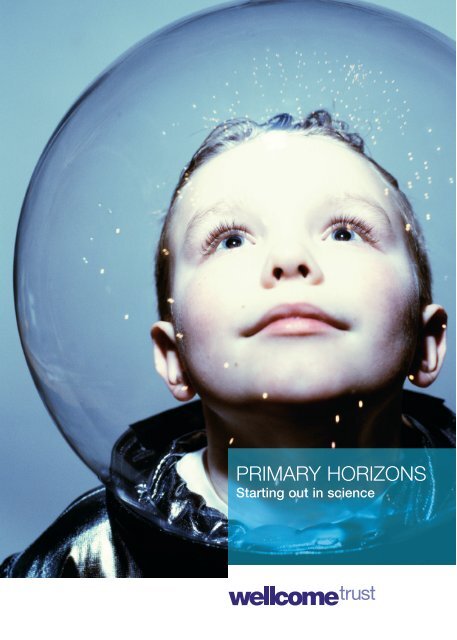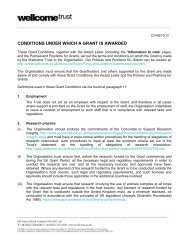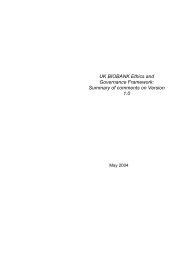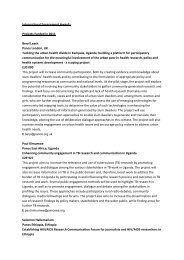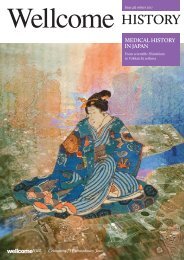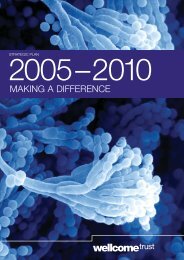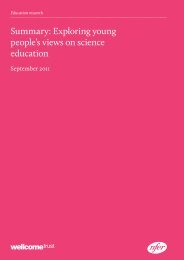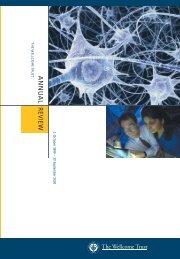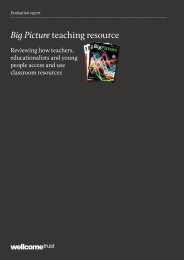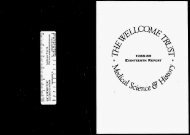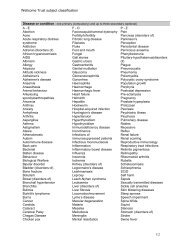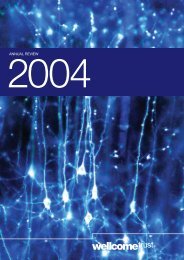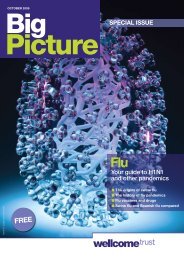Primary Horizons: Starting out in science - Wellcome Trust
Primary Horizons: Starting out in science - Wellcome Trust
Primary Horizons: Starting out in science - Wellcome Trust
- No tags were found...
You also want an ePaper? Increase the reach of your titles
YUMPU automatically turns print PDFs into web optimized ePapers that Google loves.
PRIMARY HORIZONS<strong>Start<strong>in</strong>g</strong> <strong>out</strong> <strong>in</strong> <strong>science</strong>
The <strong>Wellcome</strong> <strong>Trust</strong> is an <strong>in</strong>dependent biomedicalresearch-fund<strong>in</strong>g charity that aims to improve human andanimal health. We work with lead<strong>in</strong>g researchers to <strong>in</strong>formthe direction of our education programme and to generatewider discussion <strong>in</strong> the education community.This report, based on a scop<strong>in</strong>g study carried <strong>out</strong> forthe <strong>Wellcome</strong> <strong>Trust</strong> by Queen’s University Belfast andSt Mary’s University College Belfast, sets <strong>out</strong> to exploreteachers’ views and experiences of primary <strong>science</strong> acrossthe United K<strong>in</strong>gdom and to identify ways <strong>in</strong> which it couldbe improved. The publication of <strong>Primary</strong> <strong>Horizons</strong> comesat an important time, with suggestions of a decl<strong>in</strong>e <strong>in</strong>children’s attitudes towards <strong>science</strong> <strong>in</strong> the later primaryyears. Revers<strong>in</strong>g such a trend will require action fromacross the <strong>science</strong> education community to ensurethe needs of both teachers and pupils are met.Full report available atwww.wellcome.ac.uk/primaryhorizonsPlease email your views and comments on this reportto education@wellcome.ac.ukACKNOWLEDGEMENTSProject directors and authorsDr Colette Murphy, Head of Learn<strong>in</strong>g andTeach<strong>in</strong>g, Graduate School of Education,Queen’s University BelfastDr Jim Beggs, Head of Science,St Mary’s University College BelfastHannah Russell, Project Manager,Education, <strong>Wellcome</strong> <strong>Trust</strong>Dr Lisa MeltonProject teamProfessor Peter Neil,University of Wales, AberystwythHilary Atk<strong>in</strong>son,Edge Hill College of Higher EducationDr Gerald<strong>in</strong>e Magennis,St Mary’s University College BelfastKaren Carlisle,Graduate School of Education,Queen’s University BelfastNoel Purdy,Graduate School of Education,Queen’s University BelfastOlive Getty,Graduate School of Education,Queen’s University Belfast
ContentsOverview 2Executive summary 3Recommendations 6Introduction 7Research methods 9Research f<strong>in</strong>d<strong>in</strong>gs 11Research conclusions 24
Overview1. A high proportion of primary teachers feel they lack the confidence, expertiseand tra<strong>in</strong><strong>in</strong>g to teach current <strong>science</strong> curricula effectively.2. Good-quality cont<strong>in</strong>u<strong>in</strong>g professional development is considered key to improv<strong>in</strong>gprimary teacher confidence; teachers who have carried <strong>out</strong> any professionaldevelopment <strong>in</strong> <strong>science</strong> appear more confident <strong>in</strong> nearly all aspects of<strong>science</strong> teach<strong>in</strong>g.3. Teachers view mak<strong>in</strong>g <strong>science</strong> more relevant to children’s everyday lives as keyto engag<strong>in</strong>g them with <strong>science</strong> and help<strong>in</strong>g them to become active and <strong>in</strong>formedcitizens, able to understand and take decisions ab<strong>out</strong> the impact of scientificand technological developments.4. Use of ‘creative contexts’ such as role-play, stories, cross-curricular teach<strong>in</strong>g andreal open-ended <strong>in</strong>vestigation is currently limited <strong>in</strong> primary <strong>science</strong>, with femaleteachers more likely than males to use many of these approaches.5. Fund<strong>in</strong>g for primary <strong>science</strong> varies between regions and between schools with<strong>in</strong>the same region. With<strong>in</strong> schools, fund<strong>in</strong>g for resources may vary widely betweencore subject areas. Further research is needed <strong>in</strong>to the extent of thesedifferences and <strong>in</strong>to m<strong>in</strong>imum levels of fund<strong>in</strong>g required to providehigh-quality primary <strong>science</strong> teach<strong>in</strong>g.2 <strong>Primary</strong> Science Education Report SEPTEMBER 2005
Executive summary“It is possible to store the m<strong>in</strong>d with a millionfacts and still be entirely uneducated.”Alec BourneChildren’s early years are key to shap<strong>in</strong>g society’sattitudes towards <strong>science</strong>. By the time children reachsecondary school, they will have experienced sevenyears of school<strong>in</strong>g and will have well-developedattitudes to <strong>science</strong>. While this could be of great benefitwhere attitudes are positive, several recent studies,for example by Murphy & Beggs (2003a) 1 , suggest thatchildren’s attitudes towards <strong>science</strong> are decl<strong>in</strong><strong>in</strong>g <strong>in</strong> thelater primary years. In an age of rapid advancement <strong>in</strong><strong>science</strong> and technology, such a trend is clearly worry<strong>in</strong>g, notjust because of the need to ensure a cont<strong>in</strong>u<strong>in</strong>g supply ofhighly tra<strong>in</strong>ed and competent scientists but also, and perhapsmore crucially, because of the importance of equipp<strong>in</strong>g youngpeople to understand the impact of <strong>science</strong> on their livesand to take decisions based on this understand<strong>in</strong>g.In the late 1980s and early 1990s, new curricula 2 were<strong>in</strong>troduced across the UK that def<strong>in</strong>ed for the first timewhat aspects of <strong>science</strong> should be taught at primary level.While most people agree that great steps forward havebeen taken s<strong>in</strong>ce this time, there are now concerns thattoo much emphasis has been placed on scientific contentat the expense of skills and enjoyment, and that teachershave not been adequately supported to provide a positivelearn<strong>in</strong>g experience for their pupils.This report summarises the key features of research carried<strong>out</strong> for the <strong>Wellcome</strong> <strong>Trust</strong> by the Graduate School of Educationat Queen’s University Belfast and the Science Department atSt Mary’s University College Belfast to scope the experience ofprimary <strong>science</strong> education across the United K<strong>in</strong>gdom. Thoughtto be the largest piece of research undertaken <strong>in</strong>to UK primary<strong>science</strong> education, the study sets <strong>out</strong> to explore teachers’ viewsand experiences of primary <strong>science</strong> and to identify ways <strong>in</strong> whichit could be improved.Previous studies, for example by Harlen et al. (1995) 3 , havehighlighted primary teachers’ lack of scientific backgroundknowledge and lack of confidence <strong>in</strong> teach<strong>in</strong>g <strong>science</strong>. Thecurrent study showed that such views are strongly supportedby primary teachers themselves, with half of all respondentspo<strong>in</strong>t<strong>in</strong>g towards lack of knowledge, expertise, confidence andtra<strong>in</strong><strong>in</strong>g as their ma<strong>in</strong> concern <strong>in</strong> teach<strong>in</strong>g <strong>science</strong>. Other keyissues identified by teachers <strong>in</strong>cluded lack of f<strong>in</strong>ancialresources, time and <strong>in</strong>-class support, an overloaded <strong>science</strong>curriculum and large class sizes. Other stakeholder groupsalso identified the lack of opportunities for open-ended<strong>in</strong>vestigation and the lack of confidence to facilitateopen-ended <strong>in</strong>vestigation as two key issues fac<strong>in</strong>gprimary <strong>science</strong>.Teachers found both English and mathematics easier to teachthan <strong>science</strong> and ma<strong>in</strong>ly attributed their lack of confidence <strong>in</strong><strong>science</strong> to poor background knowledge and limited tra<strong>in</strong><strong>in</strong>g.Professional development appeared to exert a profound<strong>in</strong>fluence on levels of confidence; teachers who had carried<strong>out</strong> cont<strong>in</strong>u<strong>in</strong>g professional development (CPD) <strong>in</strong> <strong>science</strong>were more confident <strong>in</strong> nearly all aspects of <strong>science</strong> teach<strong>in</strong>g.Interest<strong>in</strong>gly, those from larger schools tended to be moreconfident than teachers from smaller schools, perhapsreflect<strong>in</strong>g greater opportunities for support from colleaguesor to engage <strong>in</strong> CPD.Where topics common to <strong>science</strong> curricula <strong>in</strong> all four homenations were considered, there were surpris<strong>in</strong>g discrepanciesbetween what teachers and pupils regarded as difficult. Teacherswere most comfortable teach<strong>in</strong>g content-driven topics such asthe life cycle of a flower<strong>in</strong>g plant, and had less confidence whentry<strong>in</strong>g to expla<strong>in</strong> more conceptually challeng<strong>in</strong>g topics such assources of energy. In contrast, many children f<strong>in</strong>d the complexterm<strong>in</strong>ology <strong>in</strong>volved <strong>in</strong> learn<strong>in</strong>g the parts of the flower one of themost difficult tasks they encounter <strong>in</strong> primary <strong>science</strong> classes 4 .<strong>Primary</strong> <strong>science</strong> education should of course not just beconcerned with knowledge, but also with the acquisition ofscientific concepts and the development of scientific andth<strong>in</strong>k<strong>in</strong>g skills. It should aim for young people to developattributes such as perseverance, <strong>in</strong>dependence, cooperationand curiosity. Ultimately it should seek to develop the sortsof skills that will help young people to become active and<strong>in</strong>formed citizens as well as equipp<strong>in</strong>g them with theunderp<strong>in</strong>n<strong>in</strong>g conceptual knowledge. This last idea is oftenknown as ‘scientific literacy’. Nearly a third of all teachers <strong>in</strong>the study suggested that the best way to develop children’sscientific literacy is to make <strong>science</strong> more relevant to theireveryday lives.1 Murphy C, Beggs J. Children's perceptions of school <strong>science</strong>.School Science Review 2003; 84(308): 109–116.2 The National Curriculum for England and Wales, the 5–14 NationalGuidel<strong>in</strong>es <strong>in</strong> Scotland, and the Northern Ireland Curriculum.3 Harlen W, Holdroyd C, Byrne M, Confidence and Understand<strong>in</strong>g <strong>in</strong>Teach<strong>in</strong>g Science and Technology <strong>in</strong> <strong>Primary</strong> Schools. Ed<strong>in</strong>burgh:Scottish Council for Research <strong>in</strong> Education; 1995.4 Murphy C, Beggs J. Children's perceptions of school <strong>science</strong>.School Science Review 2003; 84(308): 109–116.<strong>Primary</strong> Science Education Report SEPTEMBER 20053
There are various ways <strong>in</strong> which teachers can relate<strong>science</strong> to pupils’ everyday lives, both <strong>in</strong>side and<strong>out</strong>side the classroom, and creative approaches canbe extremely effective <strong>in</strong> this regard, enabl<strong>in</strong>g youngpeople to approach <strong>science</strong> from fresh perspectives 5-6 .In the current study, considerable gender differenceswere observed between teachers <strong>in</strong> their use ofcreativity, with female teachers more likely than malesto use role-play and stories, to focus on th<strong>in</strong>k<strong>in</strong>g skills,to relate <strong>science</strong> to everyday life or to <strong>in</strong>tegrate <strong>science</strong>with other curricular areas.Cross-curricular approaches to <strong>science</strong> teach<strong>in</strong>g canbe highly motivational for both teachers and pupils butare often constra<strong>in</strong>ed by national curricula, particularly,as with England and Wales, where <strong>science</strong> forms aseparate curriculum subject. While the National <strong>Primary</strong>Strategy <strong>in</strong> England states that ‘there is no requirementfor subjects to be taught discretely – they can begrouped, or taught through projects’ 7 , the currentresearch found that <strong>science</strong> is poorly <strong>in</strong>tegrated withother curricular areas. Given the particular value ofhistory <strong>in</strong> br<strong>in</strong>g<strong>in</strong>g <strong>science</strong> to life, exemplified amongadults by works such as Bill Bryson’s A Short HistoryOf Nearly Everyth<strong>in</strong>g 8 , the study demonstrated that fewteachers brought history <strong>in</strong>to their <strong>science</strong> teach<strong>in</strong>g.Open-ended <strong>in</strong>vestigation <strong>in</strong> primary <strong>science</strong> providesperhaps the most important opportunity for childrento develop scientific th<strong>in</strong>k<strong>in</strong>g and manipulative skills,and a lack of real open-ended <strong>in</strong>vestigative work isconsidered by many to be one of the reasons why<strong>science</strong> fails to grab children’s <strong>in</strong>terest <strong>in</strong> the laterprimary school years 9 . Teachers <strong>in</strong>terviewed aspart of the study admitted these activities are timeconsum<strong>in</strong>g and seem<strong>in</strong>gly <strong>in</strong> competition for timewith the more urgent preparation for national tests.The report also suggests lack of confidence may bedeterr<strong>in</strong>g teachers from <strong>in</strong>clud<strong>in</strong>g more open-ended<strong>in</strong>vestigative work <strong>in</strong> their classes.More than half of the teachers surveyed <strong>in</strong> thestudy lacked confidence <strong>in</strong> us<strong>in</strong>g Information andCommunications Technology (ICT) <strong>in</strong> <strong>science</strong> teach<strong>in</strong>g.This is despite the fact that use of the <strong>in</strong>ternet <strong>in</strong>primary <strong>science</strong> education is <strong>in</strong>creas<strong>in</strong>g rapidly and ICTis thought to be a key r<strong>out</strong>e to support both the skillsand attitudes, and more knowledge-based aspects ofprimary <strong>science</strong>. Ball (2003) 10 describes four ways <strong>in</strong>which ICT is used <strong>in</strong> primary <strong>science</strong>: as a tool, as areference source, as a means of communication andas a means for exploration. The current researchsuggests systematic professional development isessential if these four uses are to be achieved.Young people often respond very positively toconstructive feedback that tracks their progressand <strong>in</strong>forms their development. Teachers <strong>in</strong> thisstudy agreed that both teachers and children f<strong>in</strong>dthis sort of ‘formative assessment’ (also knownas ‘assessment for learn<strong>in</strong>g’) more enjoyable than‘summative assessment’, where the ma<strong>in</strong> purposeis to give a quantitative grad<strong>in</strong>g. Once aga<strong>in</strong>, theuse of formative assessment appears to be related toprofessional development; <strong>in</strong> most cases only teacherswho had undertaken professional development werelikely to <strong>in</strong>clude <strong>in</strong>vestigations, m<strong>in</strong>d mapp<strong>in</strong>g and<strong>in</strong>dividual target sett<strong>in</strong>g as part of their assessment<strong>in</strong> <strong>science</strong>.An <strong>in</strong>terest<strong>in</strong>g relationship was also apparent <strong>in</strong> thef<strong>in</strong>d<strong>in</strong>gs between teachers’ assessment style andwhether schools had received extra fund<strong>in</strong>g for<strong>science</strong>; teachers who said their schools had receivedextra fund<strong>in</strong>g for <strong>science</strong>, i.e. <strong>out</strong>side core fund<strong>in</strong>g,appeared to be more likely to discuss and question,or to use peer assessment as part of theirassessment techniques. This relationshipwould warrant further analysis.5 National Advisory Committee on Creative and Cultural Education.All Our Futures: Creativity, Culture and Education. NACCCE; 1999.www.dfes.gov/naccce/<strong>in</strong>dex1.shtml [accessed 30 June 2005].6 Centre for Applied Theatre Research, University of Manchester.Mak<strong>in</strong>g it Live: An Evaluation of Pulse (phase 1): a perform<strong>in</strong>garts and <strong>science</strong> <strong>in</strong>itiative with young people funded by the<strong>Wellcome</strong> <strong>Trust</strong>. (Not yet published.)7 Department for Education and Skills. Excellence and enjoyment:A strategy for primary schools. DfES; May 2003.www.dfes.gov.uk/primary/publications/literacy/63553/ [accessed 30 June 2005].8 Bryson B. A Short History of Nearly Everyth<strong>in</strong>g.London: Black Swan; 2004.9 For example, Campbell B, Pupils' perceptions of <strong>science</strong> educationat primary and secondary school. In: Behrendt H, Dahncke H et al.Research <strong>in</strong> Science Education – Past, Present and Future.London: Kluwer Academic Publishers; 2001. Also see footnote 4.10 Ball S. ICT that works. <strong>Primary</strong> Science Review 2003; 76: 11–13.4 <strong>Primary</strong> Science Education Report SEPTEMBER 2005
One of the challenges for effective <strong>science</strong> teach<strong>in</strong>gis to make all topics accessible to both boys andgirls; more boys than girls still choose to study mathsand <strong>science</strong>s <strong>in</strong> post-16 education and beyond.Interest<strong>in</strong>gly, while most of the teachers <strong>in</strong> this studysaid they feel that levels of <strong>in</strong>terest <strong>in</strong> <strong>science</strong> at primarylevel are similar between boys and girls, nearly half alsoadmitted that they try hard to get girls more <strong>in</strong>volved <strong>in</strong><strong>science</strong>. Views ab<strong>out</strong> the extent to which girls engage<strong>in</strong> primary <strong>science</strong> were varied. Many teachers of olderprimary children felt girls are more passive, whileothers ma<strong>in</strong>ta<strong>in</strong>ed that personality, rather than gender,determ<strong>in</strong>es engagement <strong>in</strong> <strong>science</strong>. Still others believedthat girls are more methodical than boys <strong>in</strong> theirapproach to practical work. Overall, girls’ and boys’performance on national <strong>science</strong> tests were feltto be similar.Fund<strong>in</strong>g is an important consideration for all schools.In addition to core fund<strong>in</strong>g, many schools generateor receive additional funds through resourcefulnessor generosity. While most teachers recognise thatfund<strong>in</strong>g is not the answer to all their educationconcerns, they acknowledge that excit<strong>in</strong>g and highquality<strong>science</strong> teach<strong>in</strong>g does require some goodresources. This study found disparities betweenfund<strong>in</strong>g for <strong>science</strong> <strong>in</strong> different schools, and betweenfund<strong>in</strong>g for <strong>science</strong> and different subject areas.Extreme examples suggested that one schoolreceived only £500 per year for <strong>science</strong>, comparedwith £10 000 for English, while another, with 240pupils, only received £120 for <strong>science</strong>. Furtherresearch <strong>in</strong>to the extent of these disparities betweenand with<strong>in</strong> schools <strong>in</strong> each home nation wouldcerta<strong>in</strong>ly be valuable.In addition to fund<strong>in</strong>g, schools can also benefit fromthe support of primary <strong>science</strong> <strong>in</strong>itiatives such as thosepioneered by Higher Education Institutions and others.Many of these projects <strong>in</strong>corporate <strong>in</strong>novative teach<strong>in</strong>gapproaches such as concept cartoons and co-teach<strong>in</strong>gbetween <strong>science</strong> student teachers and classroomteachers. These have undoubtedly benefited childrenand teachers <strong>in</strong> the project schools although benefitsoften fail to reach the UK school population as a whole.In the light of the f<strong>in</strong>d<strong>in</strong>gs described, the report sets <strong>out</strong>a number of recommendations. It is clear that primaryteachers should be provided with more opportunitiesfor career-long professional development <strong>in</strong> <strong>science</strong>.The hope is that the Science Learn<strong>in</strong>g Centres willplay a valuable role <strong>in</strong> this respect. These centres aimto enable primary and secondary teachers to enhancetheir professional skills by engag<strong>in</strong>g with contemporaryscientific ideas and tra<strong>in</strong><strong>in</strong>g <strong>in</strong> effective teach<strong>in</strong>gapproaches and modern scientific techniques.Greater emphasis should be placed by all across the<strong>science</strong> education community on: mak<strong>in</strong>g primary<strong>science</strong> more relevant to children’s everyday lives;us<strong>in</strong>g creative approaches; develop<strong>in</strong>g children’sth<strong>in</strong>k<strong>in</strong>g, question<strong>in</strong>g and <strong>in</strong>vestigative skills; andfacilitat<strong>in</strong>g more and better use of ICT.Curriculum content, opportunities for cross-curricularwork<strong>in</strong>g and assessment methods should be reviewedto ensure there are sufficient opportunities to harnesschildren’s enthusiasm and develop their understand<strong>in</strong>gand skills rather than just factual recall.F<strong>in</strong>ally, this report calls for further research <strong>in</strong>to thefund<strong>in</strong>g of school <strong>science</strong> to ensure teachers havesufficient resources to carry <strong>out</strong> their roles effectively.The success of all of these recommendations will relyon greater collaboration between stakeholders across<strong>science</strong> education to ensure the needs of all teachers<strong>in</strong> all schools are met.<strong>Primary</strong> Science Education Report SEPTEMBER 20055
Recommendations1. Greater emphasis needs to be placed on stimulat<strong>in</strong>genthusiasm for <strong>science</strong> so that fewer children lose <strong>in</strong>teresttowards the end of their primary education. Developmentsshould <strong>in</strong>clude mak<strong>in</strong>g primary <strong>science</strong> more relevant tochildren’s everyday lives and plac<strong>in</strong>g a greater focus onchildren’s th<strong>in</strong>k<strong>in</strong>g, question<strong>in</strong>g and <strong>in</strong>vestigative skills.More mean<strong>in</strong>gful and enjoyable primary <strong>science</strong> couldlead to a better uptake of <strong>science</strong> at secondary levelsand potentially <strong>in</strong>crease the number of people choos<strong>in</strong>gto enter <strong>science</strong>-related careers.2. <strong>Primary</strong> teachers should be provided with moreopportunities for career-long cont<strong>in</strong>u<strong>in</strong>g professionaldevelopment <strong>in</strong> <strong>science</strong>. Most primary teachers are not<strong>science</strong> specialists and would benefit from greater supportto help them develop their <strong>science</strong> teach<strong>in</strong>g skills and <strong>in</strong>creasetheir confidence. Policy makers, teacher educators and CPDproviders should work <strong>in</strong> partnership to ensure a national,structured programme is <strong>in</strong> place to provide teachers withopportunities to explore today’s <strong>science</strong> and <strong>in</strong>vestigate newways to make school <strong>science</strong> more excit<strong>in</strong>g. Such opportunitiesmust reach teachers <strong>in</strong> all schools to avoid miss<strong>in</strong>g those <strong>in</strong>small schools who currently feel less confident to teach <strong>science</strong>.Providers should also liaise to address certa<strong>in</strong> ‘neglected’ areassuch as <strong>in</strong>tegrat<strong>in</strong>g <strong>science</strong> with other curricular areas andsupport<strong>in</strong>g teachers to make <strong>science</strong> more relevant to everydaylife. The Science Learn<strong>in</strong>g Centres will have an important role,enabl<strong>in</strong>g primary teachers to enhance their professional skillsby engag<strong>in</strong>g with contemporary scientific ideas and tra<strong>in</strong><strong>in</strong>g <strong>in</strong>effective teach<strong>in</strong>g approaches and modern scientific techniques.3. Policy makers should provide schools with budgetaryguidel<strong>in</strong>es to ensure their <strong>science</strong> activities areappropriately funded. This study found <strong>in</strong>equality <strong>in</strong> fund<strong>in</strong>g for<strong>science</strong> <strong>in</strong> different schools and between subjects with<strong>in</strong> schools.More detailed research should be undertaken to explorethe nature of fund<strong>in</strong>g for primary <strong>science</strong>.4. <strong>Primary</strong> teachers should be further supported to makeeffective use of <strong>in</strong>formation and communication technology(ICT) <strong>in</strong> their <strong>science</strong> teach<strong>in</strong>g. Although the use of the <strong>in</strong>ternet<strong>in</strong> primary <strong>science</strong> education is <strong>in</strong>creas<strong>in</strong>g rapidly, many teachersare not confident ab<strong>out</strong> us<strong>in</strong>g this and other forms of ICT forteach<strong>in</strong>g <strong>science</strong>.5. There should be a review of curriculum content toprovide greater opportunities for teachers to focus ontopics likely to develop scientific skills and generateenthusiasm. It is hoped that primary <strong>science</strong> will benefitfrom the latest moves <strong>in</strong> secondary <strong>science</strong> to reducecourse content <strong>in</strong> favour of develop<strong>in</strong>g broader skills.Complex scientific term<strong>in</strong>ology should be used only whenappropriate, for <strong>in</strong>stance, when answer<strong>in</strong>g children’s specificquestions, when expla<strong>in</strong><strong>in</strong>g the more scientific use of otherwisefamiliar terms (e.g. <strong>in</strong>sulation) or when children <strong>in</strong>troducecomplex language themselves (such as names of d<strong>in</strong>osaurs).6. Assessment programmes should be reviewed to ensurechildren are tested on scientific understand<strong>in</strong>g and skillsrather than simply factual recall. Further research should becarried <strong>out</strong> <strong>in</strong>to the effects of national tests <strong>in</strong> <strong>science</strong> uponopportunities for children to develop <strong>in</strong>vestigative, question<strong>in</strong>gand th<strong>in</strong>k<strong>in</strong>g skills.7. The l<strong>in</strong>ks between <strong>science</strong> and other subjects should bemade more explicit and strengthened to help br<strong>in</strong>g <strong>science</strong>to life and develop transferable skills.8. There should be wider use of creative and <strong>in</strong>novativeapproaches such as role-plays, stories and co-teach<strong>in</strong>gbetween exist<strong>in</strong>g teachers and specialist <strong>science</strong> tra<strong>in</strong><strong>in</strong>gteachers. Many of these techniques have been shown toimprove teachers’ confidence and skills to teach <strong>science</strong>and to spark children’s <strong>in</strong>terest and enthusiasm.9. All new teachers should be provided with a solidbackground <strong>in</strong> scientific skills and understand<strong>in</strong>g as part oftheir tra<strong>in</strong><strong>in</strong>g. Initial teacher tra<strong>in</strong><strong>in</strong>g programmes need to shownew teachers how to make <strong>science</strong> more relevant to the lives ofthe children they teach and to provide practical expertise <strong>in</strong> howto plan, design and run simple <strong>science</strong> <strong>in</strong>vestigations.The success of all of these recommendations will rely on greatercollaboration between stakeholders across <strong>science</strong> educationto ensure the needs of teachers <strong>in</strong> all schools are met.6<strong>Primary</strong> Science Education Report SEPTEMBER 2005
IntroductionThe United K<strong>in</strong>gdom has an enviable global position at theforefront of scientific research. In a society where scientific andtechnological advances are play<strong>in</strong>g an <strong>in</strong>creas<strong>in</strong>g role <strong>in</strong> shap<strong>in</strong>gour lives, the education of today’s young people will be crucial <strong>in</strong>determ<strong>in</strong><strong>in</strong>g not only whether this position cont<strong>in</strong>ues but also <strong>in</strong>ensur<strong>in</strong>g that young people develop the skills that will help themto make <strong>in</strong>formed decisions ab<strong>out</strong> the impacts of thesedevelopments on their lives.Children are natural explorers, curious ab<strong>out</strong> the world aroundthem. Their scientific question<strong>in</strong>g starts at a very early age:“Where do ra<strong>in</strong>bows come from?”, “Why does the moon changeshape?”, “How do I hear sounds?”. Today, educationalists arestart<strong>in</strong>g to realise the importance of cultivat<strong>in</strong>g and harness<strong>in</strong>gthis natural curiosity <strong>in</strong> their <strong>science</strong> lessons. But despite relativelyhigh atta<strong>in</strong>ment <strong>in</strong> national tests, there is grow<strong>in</strong>g concern thatwhat is actually be<strong>in</strong>g measured is often children’s ability tomemorise facts rather than to develop skills and understand<strong>in</strong>g 11 .The Parliamentary Office of Science and Technology Postnote<strong>in</strong> September 2003 12 highlighted several key issues for primary<strong>science</strong> education <strong>in</strong>clud<strong>in</strong>g: decl<strong>in</strong><strong>in</strong>g pupil <strong>in</strong>terest <strong>in</strong> <strong>science</strong>;the balance between teach<strong>in</strong>g factual knowledge and the skills ofscientific enquiry; the effects of national tests; and the importanceof teachers’ scientific knowledge and confidence.Such issues are reflected <strong>in</strong> both research studies and <strong>in</strong>spectionreports across the UK. The decl<strong>in</strong>e <strong>in</strong> young people’s <strong>in</strong>terest <strong>in</strong><strong>science</strong> has now been highlighted by several studies, <strong>in</strong>clud<strong>in</strong>gthe 2003 Trends <strong>in</strong> International Mathematics and Science Study(TIMSS), which reported a fall <strong>in</strong> the proportion of ten-year-olds<strong>in</strong> England who said they enjoyed <strong>science</strong> lessons from 80 percent <strong>in</strong> 1995 to 68 per cent <strong>in</strong> 2003 13 . The need to addressteachers’ scientific knowledge and confidence has similarlybeen emphasised by several sources, <strong>in</strong>clud<strong>in</strong>g <strong>in</strong>spectionreports from both England and Scotland 14-15 . National testshave been widely criticised by the Welsh <strong>in</strong>spectorate, and theChief Inspector of Schools <strong>in</strong> Wales has highlighted the risks ofteachers concentrat<strong>in</strong>g too much on <strong>science</strong> activities ‘that focustoo narrowly on questions similar to those <strong>in</strong> the national tests’,thereby leav<strong>in</strong>g too little time for ‘practical and problem-solv<strong>in</strong>gactivities’ 16 . The importance of provid<strong>in</strong>g sufficient opportunitiesfor scientific enquiry has also been highlighted as a priority bythe Northern Ireland Department of Education 17 .Others have blamed the grow<strong>in</strong>g emphasis on literacy andnumeracy for marg<strong>in</strong>alis<strong>in</strong>g <strong>science</strong>. At the primary level, read<strong>in</strong>g,writ<strong>in</strong>g and arithmetic often dom<strong>in</strong>ate the curriculum, and witha heavily content-driven <strong>science</strong> curriculum there may be fewopportunities for children to th<strong>in</strong>k creatively, consider social andethical issues, ‘explore, and <strong>in</strong>vestigate their own questions,or further their own <strong>in</strong>tellectual development’ 18 .More than 15 years s<strong>in</strong>ce primary <strong>science</strong> curricula were first<strong>in</strong>troduced <strong>in</strong>to all four home nations, what is now needed is agreater focus on spark<strong>in</strong>g children’s <strong>in</strong>terest and enthusiasm,develop<strong>in</strong>g their skills and understand<strong>in</strong>g, and giv<strong>in</strong>g them asense of the relevance of <strong>science</strong> to their everyday lives. If futuregenerations are to choose to enter scientific careers and toengage with the issues raised by developments <strong>in</strong> <strong>science</strong> andtechnology, the education community must confront thechallenges for primary <strong>science</strong> as well as those <strong>in</strong> secondaryeducation and beyond. The good news is that many primaryteachers are already lead<strong>in</strong>g the way, provid<strong>in</strong>g top-quality<strong>science</strong> education. Several <strong>in</strong>itiatives are also <strong>in</strong> place to supportteachers and pupils, not least the <strong>Wellcome</strong> <strong>Trust</strong> and DfESfundedScience Learn<strong>in</strong>g Centres but also the valuable worksupported by organisations such as the AstraZeneca ScienceTeach<strong>in</strong>g <strong>Trust</strong>, Creative Partnerships and others. Mov<strong>in</strong>gforward will rely on a comprehensive programme of cont<strong>in</strong>u<strong>in</strong>gprofessional development (CPD) to provide support for all primaryteachers and may require changes at a policy level. Underp<strong>in</strong>n<strong>in</strong>gthe success of any reforms will be the engagement of andcollaboration between stakeholder groups across the<strong>science</strong> education community.11 Murphy C, Beggs J. Children's perceptions of school <strong>science</strong>.School Science Review 2003; 84(308): 109–116.12 Parliamentary Office for Science and Technology (POST). Postnote:<strong>Primary</strong> Science. London: Parliamentary Office for Science andTechnology; 2003.13 Ruddock G et al. Where England stands <strong>in</strong> the Trends <strong>in</strong> InternationalMathematics and Science Study (TIMSS) 2003. In: National report forEngland, Slough: National Foundation for Educational Research; 2004.www.nfer.ac.uk/timss2003 [accessed 30 June 2005].14 Ofsted. Ofsted Subject Reports 2002/03: Science <strong>in</strong> <strong>Primary</strong> Schools.London: Ofsted; 2004.<strong>Primary</strong> Science Education Report SEPTEMBER 2005 7
This scop<strong>in</strong>g study, carried <strong>out</strong> for the <strong>Wellcome</strong> <strong>Trust</strong> byQueen’s University Belfast and St Mary’s University CollegeBelfast, set <strong>out</strong> to explore teachers’ views and experiencesof primary <strong>science</strong> learn<strong>in</strong>g and teach<strong>in</strong>g across the UK andto identify ways <strong>in</strong> which primary <strong>science</strong> for both teachersand children could be improved.The key objectives of the study were to:• identify current challenges, good practice andopportunities <strong>in</strong> relation to the follow<strong>in</strong>g focus areas:• children’s attitudes to school <strong>science</strong>• classroom practice <strong>in</strong> primary <strong>science</strong>• use of formative assessment• creative contexts for <strong>science</strong> teach<strong>in</strong>g• <strong>in</strong>clusion <strong>in</strong> <strong>science</strong> classrooms• relationship between <strong>science</strong> and othercurricular areas• additional sources of fund<strong>in</strong>g <strong>out</strong>sidema<strong>in</strong>stream fund<strong>in</strong>g• explore how scientific literacy can be best developed<strong>in</strong> the primary classroom• review a range of small- and large-scale <strong>science</strong> <strong>in</strong>itiatives<strong>in</strong> primary schools and provide an overall assessmentof their impact for primary <strong>science</strong>• make recommendations for future primary <strong>science</strong>education <strong>in</strong>itiatives.15 HM Inspectors if Schools. Improv<strong>in</strong>g Science Education 5–14.Ed<strong>in</strong>burgh: HM Inspectors of Schools; 1999.16 Estyn. The Annual Report of the Chief Inspector of Educationand Tra<strong>in</strong><strong>in</strong>g <strong>in</strong> Wales: <strong>Primary</strong> Schools. Cardiff: HM Inspectoratefor Education and Tra<strong>in</strong><strong>in</strong>g <strong>in</strong> Wales; 2003.17 Department of Education for Northern Ireland. A Survey of the Scienceand Technology Area of Study <strong>in</strong> a Sample of Northern Ireland <strong>Primary</strong>Schools (2000–2001). Bangor: DENI; 2002.18 De Boo M, Randall A. Celebrat<strong>in</strong>g a Century of <strong>Primary</strong> Science.Hatfield: Association for Science Education; 2001.8 <strong>Primary</strong> Science Education Report SEPTEMBER 2005
Research methodsThis scop<strong>in</strong>g study was designed to <strong>in</strong>vestigate the ma<strong>in</strong>challenges and opportunities for primary <strong>science</strong> educationacross the four nations of the United K<strong>in</strong>gdom. The aim wasto provide an overview rather than a detailed picture of theexact proportions of particular views held by members of the<strong>science</strong> education community. The research methodologywas designed to collect <strong>in</strong>formation <strong>in</strong> a way that would mapand <strong>in</strong>corporate the richness and complexity of attitudestowards primary <strong>science</strong>.Information was gathered from:• literature reviews• surveys of teachers and higher education <strong>in</strong>stitution personnel• focus group discussions <strong>in</strong>volv<strong>in</strong>g groups of teachers• a cross-sector consultation conference.Two literature reviews were undertaken to provide a context forthe study. One review focused on primary children’s perceptionsand attitudes towards <strong>science</strong>. The other explored the impact ofhigher education <strong>in</strong>stitution <strong>science</strong> <strong>in</strong>itiatives <strong>in</strong> primary schools<strong>in</strong> the UK.Teachers were surveyed by telephone <strong>in</strong>terviews conductedby MORI while higher education personnel responded toemail questionnaires.Quantitative researchThe first part of the telephone survey focused on factors thatmay have some <strong>in</strong>fluence on teachers’ attitudes towards<strong>science</strong>, such as gender, length of service, <strong>science</strong> background,<strong>science</strong> support and position <strong>in</strong> school (for example, <strong>science</strong>coord<strong>in</strong>ator). The rest of the survey was designed to collectdata relat<strong>in</strong>g to school factors, assessment of <strong>science</strong>, teacherconfidence <strong>in</strong> develop<strong>in</strong>g children’s knowledge and skills <strong>in</strong><strong>science</strong>, different approaches to <strong>science</strong> teach<strong>in</strong>g, and teacherattitudes towards <strong>science</strong> learn<strong>in</strong>g and teach<strong>in</strong>g. Teachers wereasked to <strong>in</strong>dicate their responses on a Likert five-po<strong>in</strong>t scale.There were also two open questions. In the first, teachers were<strong>in</strong>vited to comment on what they considered to be the ma<strong>in</strong>issues fac<strong>in</strong>g primary teachers <strong>in</strong> their <strong>science</strong> teach<strong>in</strong>g. In thesecond, teachers were asked to speculate ab<strong>out</strong> how primary<strong>science</strong> teach<strong>in</strong>g could better support children to develop thesorts of skills they need to become active and <strong>in</strong>formed citizens.The email survey was <strong>in</strong>tended for higher education <strong>in</strong>stitutions<strong>in</strong>volved <strong>in</strong> <strong>in</strong>itial teacher tra<strong>in</strong><strong>in</strong>g for primary teachers. The aimwas to assess the nature and impact of a selection of small- andlarge-scale primary <strong>science</strong> <strong>in</strong>itiatives, <strong>in</strong>clud<strong>in</strong>g <strong>in</strong>formation ab<strong>out</strong>fund<strong>in</strong>g, the nature of the work, the challenges encountered, andthe <strong>out</strong>come and perceptions of those <strong>in</strong>volved. A total of 100questionnaires were sent <strong>out</strong> by email and 30 returned. The datawas followed up with <strong>in</strong>terviews and email communication toexplore particular areas <strong>in</strong> more detail.Many primary <strong>in</strong>itiatives are developed <strong>out</strong>side higher education<strong>in</strong>stitutions but it was not possible to <strong>in</strong>clude these with<strong>in</strong> thescope of the study.<strong>Primary</strong> Science Education Report SEPTEMBER 20059
Qualitative researchThe focus group discussions <strong>in</strong>volved groups of teachers from allUK regions. They were designed to provide feedback on issuesaris<strong>in</strong>g from the telephone survey questionnaire and the literaturereview. Teachers were <strong>in</strong>vited to suggest <strong>science</strong>-teach<strong>in</strong>g issuesthat had not been addressed <strong>in</strong> the survey and to suggestpossible ways forward for primary <strong>science</strong>.Seven focus group discussions took place: three <strong>in</strong> England,one <strong>in</strong> Wales, one <strong>in</strong> Scotland and two <strong>in</strong> Northern Ireland.There was a comb<strong>in</strong>ation of teachers of younger (Key Stage 1and equivalent) and older (Key Stage 2 and equivalent) primarypupils. Group sizes ranged from six to ten teachers.No major discrepancies were found between overlapp<strong>in</strong>gareas <strong>in</strong> the focus group discussions and telephone <strong>in</strong>terviews;however, many themes emerged from the focus groupdiscussions that the telephone survey had not uncovered.This was expected s<strong>in</strong>ce the focus groups providedopportunities for open discussion.The aim of the two-day cross-sector consultation conferencewas to br<strong>in</strong>g together teachers and other stakeholders fromacross primary <strong>science</strong> education to consider key issuesaris<strong>in</strong>g from the telephone survey and focus groupdiscussions. Participants <strong>in</strong>cluded policy makers, LEAadvisers (and equivalent), teachers, teacher educators,CPD providers and other representatives from theUK <strong>science</strong> education community. It also providedan opportunity to compare and discussregional differences.The teacher sample300 primary teachers participated <strong>in</strong> the telephone <strong>in</strong>terviews;150 were from England, 50 from Scotland, 50 from Wales and50 from Northern Ireland.One-third of the teachers were men. This is a much higherpercentage than for the wider population of primary teachersbut could be expla<strong>in</strong>ed by the fact that almost half of thesample (49 per cent) was made up of school heads and15 per cent were vice-pr<strong>in</strong>cipals.Accord<strong>in</strong>g to the General Teach<strong>in</strong>g Council for England’s AnnualDigest of Statistics for 2004-2005 19 , 45 per cent (>84 000) ofprimary teachers <strong>in</strong> England are over 45 years old. In the currentstudy, more than half the teachers <strong>in</strong>terviewed (53 per cent) hadbeen teach<strong>in</strong>g for more than 20 years, while relatively few (7 percent) had been teach<strong>in</strong>g for less than five years. One-third (31per cent) of the total sample <strong>in</strong>dicated that they acted as theschool <strong>science</strong> coord<strong>in</strong>ator.19 General Teach<strong>in</strong>g Council for England. Annual Digest of Statistics:Registered Teacher Profiles 2004/2005. London: GTC; 2005.10 <strong>Primary</strong> Science Education Report SEPTEMBER 2005
Research f<strong>in</strong>d<strong>in</strong>gs1. What stimulates children’s <strong>in</strong>terest <strong>in</strong> <strong>science</strong>?It is dur<strong>in</strong>g the primary years that children’s attitudes towards<strong>science</strong> and technology are nurtured, and later carried over<strong>in</strong>to secondary school and adulthood. While this could be ofgreat benefit where attitudes towards <strong>science</strong> are positive,there are grow<strong>in</strong>g concerns that children are becom<strong>in</strong>gdisengaged with <strong>science</strong> <strong>in</strong> the later primary years. A recentsurvey by Murphy and Beggs (2003a) 20 found that older pupils(10-11 years) enjoy <strong>science</strong> less than younger ones (8-9 years)despite the older group be<strong>in</strong>g more confident ab<strong>out</strong> their abilityto do <strong>science</strong>. Although this decl<strong>in</strong>e does not appear to bel<strong>in</strong>ked to overall attitudes to school [Morrell and Ledermen(1998) 21 found that attitudes to school rema<strong>in</strong> more positivethan attitudes to <strong>science</strong> and the gap grows as students growolder], it does appear to be <strong>in</strong>ternational, with explanationsrang<strong>in</strong>g from content-driven <strong>science</strong> curricula, to <strong>in</strong>effective<strong>science</strong> teach<strong>in</strong>g and social factors.In contrast to these studies of student views, most of theteachers surveyed <strong>in</strong> this study (89 per cent) felt that primarychildren love <strong>science</strong> lessons. It made no difference whether theschool was urban or rural, large or small, nor did the children’sage group have a bear<strong>in</strong>g. Teachers also noted that both girlsand boys enjoyed <strong>science</strong> lessons equally.“I th<strong>in</strong>k <strong>science</strong> is one of the subjects whichall children enjoy and it should be givenmore prom<strong>in</strong>ence.”There is evidence that <strong>in</strong>creas<strong>in</strong>g the amount of practical,<strong>in</strong>vestigative work <strong>in</strong> <strong>science</strong> would fuel children’s positiveexperience of <strong>science</strong> <strong>in</strong> primary school (Murphy et al. 2004 22 ).Teachers <strong>in</strong> this study agreed it was the practical aspects of<strong>science</strong> children found most attractive, although manyreported a decl<strong>in</strong>e <strong>in</strong> enthusiasm when children areasked to record their work.“…Children absolutely adore do<strong>in</strong>g practicalwork <strong>in</strong> <strong>science</strong>… but I feel they detest whenyou say ‘Right, we are go<strong>in</strong>g to write a reportnow ab<strong>out</strong> what we did’ but teachers are alsounder pressure to provide evidence of whatthey have done and that is the problem. I feelafter I have done someth<strong>in</strong>g really good andthe children have had fun and they havelearned a lot…oh no they have to go andwrite this down now.”Children’s <strong>in</strong>terest can also be stimulated by mak<strong>in</strong>g <strong>science</strong>more relevant to their lives, <strong>in</strong>tegrat<strong>in</strong>g <strong>science</strong> with othersubjects, and us<strong>in</strong>g creative contexts such as role-playsand stories. These areas are considered <strong>in</strong> more detail <strong>in</strong>question 6.2. How can children’s scientific literacy be improved?There is much debate ab<strong>out</strong> what constitutes ‘scientific literacy’and ab<strong>out</strong> the nature of <strong>science</strong> that should be taught at school(Murphy et al. 2001) 23 . In this report the term ‘scientific literacy’refers to the skills that primary children need to help them tobecome active and <strong>in</strong>formed citizens, together with theconceptual knowledge that underp<strong>in</strong>s their development.In an open response question <strong>in</strong>cluded as part of the telephonesurvey, teachers were asked to give their op<strong>in</strong>ions ab<strong>out</strong> whatthey felt would best assist children to become active and<strong>in</strong>formed citizens (Figure 1).20 Murphy C, Beggs J. Children's perceptions of school <strong>science</strong>.School Science Review 2003; 84(308): 109–116.21 Morrell PD, Lederman NG. Students' attitudes towards schooland classroom <strong>science</strong>: are they <strong>in</strong>dependent phenomena?.School Science and Mathematics 1998; 98(2): 76–83.22 Murphy C et al. Students as 'catalysts' <strong>in</strong> the classroom: the impact ofco-teach<strong>in</strong>g between <strong>science</strong> student teachers and primary classroomteachers on children's enjoyment and learn<strong>in</strong>g of <strong>science</strong>. InternationalJournal of Science Education 2004; 26(8): 1023–1035.23 Murphy C et al. National Curriculum: Compulsory school <strong>science</strong> – is itimprov<strong>in</strong>g scientific literacy?. Educational Research 2001; 43(2): 189–199.<strong>Primary</strong> Science Education Report SEPTEMBER 200511
Figure 1. Teacher views on ways to improve children’sscientific literacy.Relat<strong>in</strong>g <strong>science</strong>to real lifeProfessionaldevelopmentFund<strong>in</strong>gClassroomassistantsTime for <strong>science</strong>Smaller classsizesCurriculumcontentICTBr<strong>in</strong>g<strong>in</strong>g <strong>in</strong> <strong>science</strong>expertsScience specialistteachers0555566591015161520252930Percentage of teachers (telephone survey)Nearly a third of all teachers believed the best way to help youngpeople to become active and <strong>in</strong>formed citizens is to make<strong>science</strong> more relevant to real life. This was also one ofthe top two areas for improvement identified by teachers,teacher educators, CPD providers and policy makers as partof the stakeholder conference.“If children see real purpose to what they’redo<strong>in</strong>g, relate it to real life, they will learn itmore successfully.”There are clearly a wide range of ways to make <strong>science</strong> morerelevant to children’s lives, from us<strong>in</strong>g creative approaches suchas role-plays <strong>in</strong>side the classroom to tak<strong>in</strong>g children <strong>out</strong>side theclassroom on field trips, <strong>in</strong>dustry-l<strong>in</strong>ked visits or visits to local<strong>science</strong> centres. One teacher told the story of her own soncom<strong>in</strong>g home from school and rush<strong>in</strong>g to the cutlery drawer <strong>in</strong>the kitchen, tak<strong>in</strong>g <strong>out</strong> a fork and bang<strong>in</strong>g it with the expectationthat it would sound like the tun<strong>in</strong>g fork he had seen <strong>in</strong> schoolthat day. He was distraught when it failed to reproduce thesound, yet his mother commented it was the first time hehad come home with any desire to tell her ab<strong>out</strong> anyth<strong>in</strong>gthat had happened <strong>in</strong> school.Interest<strong>in</strong>gly, the survey of primary <strong>science</strong> higher education<strong>in</strong>itiatives highlighted a gap <strong>in</strong> provision <strong>in</strong> the area of support<strong>in</strong>gteachers to make <strong>science</strong> more relevant to children’severyday lives. This is particularly noteworthy as manyteachers are not confident <strong>in</strong> this area (see question 4).After relat<strong>in</strong>g <strong>science</strong> to children’s everyday lives, teachersidentified their own tra<strong>in</strong><strong>in</strong>g and professional developmentas the next most important factor <strong>in</strong> enhanc<strong>in</strong>g children’sscientific literacy. Some felt that teachers com<strong>in</strong>g <strong>out</strong> of collegelack the skills and knowledge to teach <strong>science</strong> <strong>in</strong> an <strong>in</strong>tegratedway. The need for greater professional development was,perhaps not surpris<strong>in</strong>gly, also supported by stakeholderconference discussions <strong>in</strong>volv<strong>in</strong>g CPD providers.The third most important factor highlighted dur<strong>in</strong>g the telephonesurvey was fund<strong>in</strong>g. Teachers felt that more fund<strong>in</strong>g would allowthem to take children <strong>out</strong> of the classroom and to use morespecialised equipment. Others po<strong>in</strong>ted <strong>out</strong> the importance offund<strong>in</strong>g to replace consumable items every time practical work iscarried <strong>out</strong>.12 <strong>Primary</strong> Science Education Report SEPTEMBER 2005
gheoneisA large m<strong>in</strong>ority of teachers felt support from a classroomassistant would be the most effective way to improvechildren’s scientific literacy. Dur<strong>in</strong>g focus group discussions,most teachers suggested an assistant to children ratio of1:15 would be adequate. A smaller proportion of teachers alsoconsidered small class sizes to be important <strong>in</strong> encourag<strong>in</strong>gscientific literacy. Others suggested that hav<strong>in</strong>g a designated<strong>science</strong> specialist teacher for every ten schools or so, whocould be called upon to help support and develop primary<strong>science</strong> teach<strong>in</strong>g, would be an advantage.Several stakeholder groups, <strong>in</strong>clud<strong>in</strong>g teacher educators, CPDproviders and many teachers, felt that giv<strong>in</strong>g <strong>science</strong> teachersgreater flexibility, with more time for <strong>science</strong> and less curriculumcontent to cover, would be critical to improv<strong>in</strong>g children’sscientific literacy.“Do children of ten need to know ab<strong>out</strong> anthersand stamens and filaments? It is not relevantto them.”It is noteworthy that while many teachers <strong>in</strong> the telephone surveyhighlighted issues relat<strong>in</strong>g to the ‘here and now’, such as fund<strong>in</strong>gand <strong>in</strong>-class support, some of these views changed when givenmore time to reflect on their <strong>science</strong> teach<strong>in</strong>g. Effective use ofICT, for example, was identified as higher priority by teachers atthe stakeholder conference than those <strong>in</strong> the telephone survey.Views on the extent to which encourag<strong>in</strong>g children to questionand <strong>in</strong>vestigate supports scientific literacy also differed betweenthe survey and other f<strong>in</strong>d<strong>in</strong>gs. Ranked <strong>in</strong> only 11th place byteachers dur<strong>in</strong>g the telephone survey, conference delegates,<strong>in</strong>clud<strong>in</strong>g groups of teachers, identified this as even moreimportant than relat<strong>in</strong>g <strong>science</strong> to children’s everyday lives. It ispossible that the latter groups may have been <strong>in</strong>fluenced byprevious discussions and keynote talks at the conference.“There should be more stress on the practicalside, and more open-ended <strong>in</strong>vestigations.”For the most part, all stakeholder groups appeared to hold similarviews with regards to engag<strong>in</strong>g young people with <strong>science</strong> andimprov<strong>in</strong>g their scientific literacy. An <strong>in</strong>terest<strong>in</strong>g difference was<strong>in</strong> terms of policy makers, who were alone <strong>in</strong> highlight<strong>in</strong>g theimportance of primary schools work<strong>in</strong>g together with secondaryschools as a key factor <strong>in</strong> improv<strong>in</strong>g scientific literacy. Thisperhaps reflects the fact that policy makers may often be wellplaced to observe how <strong>science</strong> is taught at both levels.3. What are the ma<strong>in</strong> issues fac<strong>in</strong>g primary<strong>science</strong> teach<strong>in</strong>g?The key f<strong>in</strong>d<strong>in</strong>g from this study suggests that primaryteachers lack confidence <strong>in</strong> their <strong>science</strong> teach<strong>in</strong>g,particularly <strong>in</strong> relation to carry<strong>in</strong>g <strong>out</strong> simple <strong>science</strong><strong>in</strong>vestigations. In an open question, half of all teachersquestioned as part of the telephone survey highlightedlack of knowledge, expertise, confidence and tra<strong>in</strong><strong>in</strong>g<strong>in</strong> <strong>science</strong> as the ma<strong>in</strong> issue fac<strong>in</strong>g primary teachers<strong>in</strong> their <strong>science</strong> teach<strong>in</strong>g (Figure 2).Age, and therefore perhaps time <strong>in</strong> service, appeared to<strong>in</strong>fluence teachers’ views on confidence and tra<strong>in</strong><strong>in</strong>g: whilefew teachers (23 per cent) <strong>in</strong> their 20s felt that lack of <strong>science</strong>tra<strong>in</strong><strong>in</strong>g was an important issue, 50–60 per cent of those <strong>in</strong>their 30s, 40s, 50s and 60s highlighted it as a major problem.There were no differences, however, between male andfemale teachers. Question 4 looks at the issue ofteacher confidence <strong>in</strong> more detail.“Teachers have [a] lack of confidence <strong>in</strong> teach<strong>in</strong>gdue to lack of <strong>science</strong> knowledge.”The second most important issue recognised by teacherswas teach<strong>in</strong>g resources. Teachers of all ages stressed lack ofresources as a concern, although fewer older teachers (28 percent) rated it as a problem than younger teachers (35 per cent).There was also a gender skew<strong>in</strong>g, with more male teachers(37 per cent) than female teachers (25 per cent) recognis<strong>in</strong>git as important. Interest<strong>in</strong>gly, professional development also<strong>in</strong>fluenced teachers’ views: only 21 per cent of teachers whohad experienced professional development <strong>in</strong> <strong>science</strong> thoughtlack of resources was an issue compared with 36 per centof those who had not received such support.<strong>Primary</strong> Science Education Report SEPTEMBER 200513
Figure 2. Issues of concern <strong>in</strong> primary <strong>science</strong>identified by teachers.Teacher knowledge,expertise, confidenceand tra<strong>in</strong><strong>in</strong>gResourcesTime available for<strong>science</strong> teach<strong>in</strong>gCurriculum contentLarge class sizesLack of classroomassistants40111017202033305040 50Percentage of teachers (telephone survey)The research also identified lack of time for <strong>science</strong> as a causefor concern. Some teachers felt that lack of time was causedby a skewed emphasis on other subjects.“Another issue is the lack of overall timebecause of the time spent on mathsand literacy.”More female teachers (22 per cent) brought up the issue of lackof time than male teachers (16 per cent). Time concerns alsovaried with age: while 12 per cent of those <strong>in</strong> their 20s ratedlack of time for <strong>science</strong> as a problem, 26 per cent did so <strong>in</strong>the 50–59 group. Some teachers’ comments po<strong>in</strong>ted at othercompound<strong>in</strong>g issues such as small classroom size and thelack of a dedicated area for practical work, which meant theyhad to move equipment around.There was aga<strong>in</strong> evidence to suggest that teachers who hadundertaken professional development <strong>in</strong> <strong>science</strong> were morepositive <strong>in</strong> relation to how much time they had for teach<strong>in</strong>g<strong>science</strong> (only 18 per cent perceived lack of time as an issue,compared with 22 per cent of teachers who said they had notundertaken professional development <strong>in</strong> <strong>science</strong>).It is noteworthy that the priority issues identified by teachersdid not always match those of a mixed stakeholder groupcompris<strong>in</strong>g teachers, teacher educators, researchers, CPDproviders and policy makers. Both groups agreed that themost important issue of concern was teachers’ lack ofknowledge, expertise, confidence and tra<strong>in</strong><strong>in</strong>g <strong>in</strong> <strong>science</strong>.Yet they differed <strong>in</strong> the next most important factor: whileteachers identified lack of resources, the mixed stakeholdergroup highlighted the lack of classroom <strong>in</strong>vestigation.14 <strong>Primary</strong> Science Education Report SEPTEMBER 2005
4. What affects teachers’ confidence to teach <strong>science</strong>?Most primary teachers are not <strong>science</strong> specialists and may feelunsure of their own scientific knowledge and skills. As described<strong>in</strong> the previous section, half of all teachers questioned highlightedlack of knowledge, expertise, confidence and tra<strong>in</strong><strong>in</strong>g <strong>in</strong> <strong>science</strong>as the ma<strong>in</strong> issue fac<strong>in</strong>g primary teachers <strong>in</strong> their <strong>science</strong>teach<strong>in</strong>g. Teachers also felt less confident teach<strong>in</strong>g <strong>science</strong>than English or mathematics, although they were moreconfident than when teach<strong>in</strong>g history, geography and<strong>in</strong>formation technology (Figure 3).Levels of confidence <strong>in</strong> specific <strong>science</strong> teach<strong>in</strong>g skills variedmarkedly. While 80 per cent of teachers were assertive ab<strong>out</strong>show<strong>in</strong>g children how to record data, only 66 per cent feltconfident <strong>in</strong> help<strong>in</strong>g children relate <strong>science</strong> to their everydaylives (Figure 4). And although strongly confident ab<strong>out</strong> theirability to make effective use of question<strong>in</strong>g, confidencedipped markedly <strong>in</strong> us<strong>in</strong>g ICT for teach<strong>in</strong>g (Figure 5).Surpris<strong>in</strong>gly, teachers’ confidence to tackle certa<strong>in</strong> scientifictopics did not always mirror children’s experience. Teachers weremost comfortable teach<strong>in</strong>g content-driven topics such as the lifecycle of a flower<strong>in</strong>g plant, and had less confidence when try<strong>in</strong>gto expla<strong>in</strong> conceptually challeng<strong>in</strong>g topics such as sources ofenergy (Figure 6). In contrast, many children f<strong>in</strong>d the complexterm<strong>in</strong>ology <strong>in</strong>volved <strong>in</strong> learn<strong>in</strong>g the parts of the flower one of themost difficult tasks they encounter <strong>in</strong> primary <strong>science</strong> classes 24 .The most important factor <strong>in</strong>fluenc<strong>in</strong>g primary teachers’confidence <strong>in</strong> <strong>science</strong> teach<strong>in</strong>g was their experience ofprofessional development; those who had carried <strong>out</strong> CPD <strong>in</strong><strong>science</strong> were more confident <strong>in</strong> nearly all aspects of <strong>science</strong>teach<strong>in</strong>g, from develop<strong>in</strong>g children’s <strong>in</strong>vestigative skills, todevelop<strong>in</strong>g their understand<strong>in</strong>g of topics deemed difficult andaddress<strong>in</strong>g how <strong>science</strong> might affect children’s lives.Teachers who had undertaken professional development <strong>in</strong><strong>science</strong> also felt more confident to decide the skills that wouldbe developed <strong>in</strong> an activity, assess and set up practical work,expla<strong>in</strong> scientific ideas and ensure all children are engaged <strong>in</strong><strong>science</strong> learn<strong>in</strong>g.Figure 3. How does primary teacher confidence <strong>in</strong> <strong>science</strong>relate to other subjects?MathsEnglishScienceHistoryGeographyICT020405660688079889580 100Percentage of teachers with high confidence(telephone survey)24 Murphy C, Beggs J. Children's perceptions of school <strong>science</strong>.School Science Review 2003; 84(308): 109–116.<strong>Primary</strong> Science Education Report SEPTEMBER 200515
School size also had an impact on teacher confidence (withteachers from small schools less confident than those fromlarger schools), although to a lesser extent than professionaldevelopment. Gender, age and extra fund<strong>in</strong>g for <strong>science</strong> hadlittle relationship with teacher confidence. There was, however,a strong correlation between confidence <strong>in</strong> the practical aspectsof <strong>science</strong> teach<strong>in</strong>g and the presence of a classroom assistant.Teachers also po<strong>in</strong>ted <strong>out</strong> the need for clear and supportiveteach<strong>in</strong>g materials and resources to help them deliverthe curriculum.Despite these difficulties, many comments were upbeat.Teachers po<strong>in</strong>ted <strong>out</strong> that they could learn alongsidethe children.Figure 4. Which <strong>science</strong> skills are primary teachers mostconfident to develop <strong>in</strong> their pupils?Record<strong>in</strong>g dataObservationFair test<strong>in</strong>gInterpret<strong>in</strong>g f<strong>in</strong>d<strong>in</strong>gs67807877“It’s not admitt<strong>in</strong>g you’re a failure by not know<strong>in</strong>gall the answers, rather it’s encourag<strong>in</strong>g thechildren to understand that there are waysof f<strong>in</strong>d<strong>in</strong>g <strong>out</strong> the answers.”Relat<strong>in</strong>g <strong>science</strong>to everyday life6650 60 70 80 90Percentage of teachers with highconfidence (telephone survey)16 <strong>Primary</strong> Science Education Report SEPTEMBER 2005
00Figure 5. Which <strong>science</strong>-teach<strong>in</strong>g skills do primaryteachers have most confidence <strong>in</strong>?Figure 6. Which <strong>science</strong> topics do primary teachershave most confidence <strong>in</strong>?Question<strong>in</strong>g86Flower<strong>in</strong>gplants85Decid<strong>in</strong>g skillsto develop80Water cycle85Ensur<strong>in</strong>g allchildren areengaged78Life processes82Organis<strong>in</strong>gpracticals77Solids, liquids,gases76Expla<strong>in</strong><strong>in</strong>gscientific ideas74Productionof sounds74Assess<strong>in</strong>gpracticals68Vision67Us<strong>in</strong>g ICT<strong>in</strong> lessonpreparation46Circuits64Us<strong>in</strong>g ICT<strong>in</strong> teach<strong>in</strong>g44Energyresources6220406080 10020406080 100Percentage of teachers with high confidence(telephone survey)Percentage of teachers with high confidence(telephone survey)<strong>Primary</strong> Science Education Report SEPTEMBER 200517
5. What formative assessment methods do teachers use?Young people often respond positively to constructive feedbackthat provides them with updates on progress and <strong>in</strong>forms theirdevelopment. Teachers <strong>in</strong> this study agreed that both teachersand children f<strong>in</strong>d this sort of formative assessment moreenjoyable than summative assessment, where the ma<strong>in</strong>purpose is to give a quantitative grad<strong>in</strong>g.Most teachers (96 per cent) <strong>in</strong>dicated that they providedfeedback with advice for improvement to children dur<strong>in</strong>g <strong>science</strong>teach<strong>in</strong>g, and a high proportion (90 per cent) evaluated children’spictures and graphs. Almost 75 per cent of teachers said theyused checklists to record their observations of children.When asked as an open question which other types ofassessment methods they used <strong>in</strong> their <strong>science</strong> teach<strong>in</strong>g,30 per cent of teachers responded that they used formal tests,14 per cent used national tests, 13 per cent used observation,10 per cent used <strong>in</strong>formal tests and quizzes, and less than1 per cent <strong>in</strong>dicated that they used m<strong>in</strong>d mapp<strong>in</strong>g or<strong>in</strong>vestigative work.Focus group discussions highlighted <strong>in</strong>terest<strong>in</strong>g differencesbetween teachers of younger and older pupils: while teachersof younger pupils seemed to make more use of checklists andpictures, teachers of older pupils used more oral assessmentmethods, such as question<strong>in</strong>g and discussion.Pressure to perform well <strong>in</strong> national tests <strong>in</strong> England andNorthern Ireland also appeared to have a considerable negative<strong>in</strong>fluence on the use of formative assessment <strong>in</strong> the later primaryyears. Teachers agreed that <strong>in</strong>clud<strong>in</strong>g <strong>science</strong> <strong>in</strong> these testsraised the profile of the subject <strong>in</strong> school, yet they felt nationaltests had a negative effect on children’s enjoyment.“…you have to try and br<strong>in</strong>g them up to thatstandard with<strong>out</strong> teach<strong>in</strong>g them to the test.Unfortunately this is what is happen<strong>in</strong>g.”An <strong>in</strong>trigu<strong>in</strong>g relationship was apparent <strong>in</strong> the f<strong>in</strong>d<strong>in</strong>gs betweenteachers’ assessment style and whether schools had receivedextra fund<strong>in</strong>g for <strong>science</strong>; teachers who said their schools hadreceived extra fund<strong>in</strong>g for <strong>science</strong>, i.e. <strong>out</strong>side core fund<strong>in</strong>g,appeared to be more likely to discuss and question, or touse peer assessment as part of their assessment, techniques.18 <strong>Primary</strong> Science Education Report SEPTEMBER 2005
Figure 7. Creative contexts used <strong>in</strong> <strong>science</strong> teach<strong>in</strong>g.DiscussionGroup workRelat<strong>in</strong>g <strong>science</strong>to real lifePupils’ own<strong>in</strong>vestigationTeacherdemonstrationDevelop<strong>in</strong>gth<strong>in</strong>k<strong>in</strong>g skillsCross-curricularworkField trips/visitsStoriesUs<strong>in</strong>g historyRole playDrama0131081916204040576080 100Percentage of teachers us<strong>in</strong>g each context often(telephone survey)63637484916. How do teachers take <strong>science</strong> beyond traditionalteach<strong>in</strong>g methods?InvestigationsTeachers questioned as part of the study were very positiveab<strong>out</strong> the power of open-ended <strong>in</strong>vestigations to supportchildren’s <strong>in</strong>terest and learn<strong>in</strong>g but admitted that the school realityoften dampens their enthusiasm. An over-emphasis oncurriculum content and pressure to prepare for national testswere felt to reduce opportunities for <strong>in</strong>vestigative work and leadto <strong>science</strong> frequently be<strong>in</strong>g taught as a collection of facts.“I want to teach through <strong>in</strong>vestigations – that ishow I was taught <strong>in</strong> my teacher tra<strong>in</strong><strong>in</strong>g but it’stime…we will set it aside and we will just talkab<strong>out</strong> it or I will do it [as a demonstration] at thefront… the time is just not available to do it.”Another issue with real open-ended <strong>in</strong>vestigative work was feltby one teacher to be young children’s need to be right.“Children th<strong>in</strong>k there should be a rightanswer…to every scientific experiment.”Creative contextsChildren enjoy <strong>science</strong> more when it is taught creatively,and such contexts can support learn<strong>in</strong>g by enabl<strong>in</strong>g themto approach <strong>science</strong> from fresh perspectives. Accord<strong>in</strong>gto a recent evaluation of the <strong>Wellcome</strong> <strong>Trust</strong>-funded Pulseprogramme, an arts and <strong>science</strong> grants programme forprimary and secondary age students, many young peoplereported <strong>in</strong>creased general knowledge of <strong>science</strong> issuesor concepts as a major <strong>out</strong>come of creative projects 25 .“It makes it more human and more th<strong>in</strong>kablesomehow to us…it just makes it feel morereal to us.” (Secondary school student)The current study showed that the ‘creative context’ mostfrequently used by primary teachers was discussion, followedby group work, and relat<strong>in</strong>g <strong>science</strong> to everyday life. The leastused creative contexts were role-play and drama (Figure 7).25 Centre for Applied Theatre Research, University of Manchester. Mak<strong>in</strong>git Live: An Evaluation of Pulse (phase 1): a <strong>Wellcome</strong> <strong>Trust</strong>-funded youngpersons' perform<strong>in</strong>g arts and <strong>science</strong> <strong>in</strong>itiative. (Not yet published.)<strong>Primary</strong> Science Education Report SEPTEMBER 200519
Female teachers tended to use creative contexts such as roleplay<strong>in</strong>gand drama <strong>in</strong> <strong>science</strong> teach<strong>in</strong>g more often than maleteachers. Some teachers did use stories, such as that of EdwardJenner, <strong>in</strong> their <strong>science</strong> teach<strong>in</strong>g but mostly with younger agegroups. Teachers of older pupils felt they needed to be bettersupported to use stories effectively <strong>in</strong> <strong>science</strong> teach<strong>in</strong>g.Th<strong>in</strong>k<strong>in</strong>g skillsVirtually all <strong>science</strong> learn<strong>in</strong>g and teach<strong>in</strong>g develops children’sth<strong>in</strong>k<strong>in</strong>g skills, yet only approximately half (56 per cent) ofteachers felt they often encouraged the development ofthese skills through their <strong>science</strong> teach<strong>in</strong>g. Few teachersfocused on th<strong>in</strong>k<strong>in</strong>g skills <strong>in</strong> the telephone survey but theywere discussed more widely as part of the focus groups.“…I th<strong>in</strong>k it [<strong>science</strong>] is brilliant for develop<strong>in</strong>gth<strong>in</strong>k<strong>in</strong>g skills because I th<strong>in</strong>k the <strong>science</strong> topicshelp to put the th<strong>in</strong>k<strong>in</strong>g skills <strong>in</strong> context. I th<strong>in</strong>k itis giv<strong>in</strong>g the th<strong>in</strong>k<strong>in</strong>g skills relevance.”Cross-curricular teach<strong>in</strong>gCross-curricular approaches to <strong>science</strong> teach<strong>in</strong>g can be highlymotivational for both teachers and pupils. Of the teacherssurveyed <strong>in</strong> this study, 40 per cent said they often <strong>in</strong>tegrated<strong>science</strong> with other subjects, and 54 per cent did so occasionally.Despite these f<strong>in</strong>d<strong>in</strong>gs, evidence gathered from the focus groupdiscussions po<strong>in</strong>t to the fact that children f<strong>in</strong>d it difficult to transferlearn<strong>in</strong>g between subjects – even between maths and <strong>science</strong>.It is possible that the very <strong>in</strong>troduction of subject boundaries,each with their own discrete programmes, has made it moredifficult to <strong>in</strong>tegrate <strong>science</strong> across the curriculum. This isparticularly likely <strong>in</strong> England and Wales, where <strong>science</strong>is taught as a separate subject.History can br<strong>in</strong>g topics to life and help to fuel children’s <strong>in</strong>terest.Half the primary teachers <strong>in</strong> the survey responded that theyoccasionally used history <strong>in</strong> their <strong>science</strong> teach<strong>in</strong>g, but only13 per cent used it often.“My children knew everyth<strong>in</strong>g ab<strong>out</strong> Galileo do<strong>in</strong>gEarth and space - it was amaz<strong>in</strong>g, they were justso <strong>in</strong>terested…”Teachers acknowledged that <strong>science</strong> history added <strong>in</strong>terest to<strong>science</strong> teach<strong>in</strong>g, but po<strong>in</strong>ted <strong>out</strong> that much of the curriculumhistory did not lend itself to teach<strong>in</strong>g <strong>science</strong> and that there arefew opportunities to br<strong>in</strong>g the two subjects together.20 <strong>Primary</strong> Science Education Report SEPTEMBER 2005
7. How do teachers deal with gender differences andspecial educational needs <strong>in</strong> <strong>science</strong>?Teachers <strong>in</strong>volved <strong>in</strong> this study did not feel gender was a majorissue <strong>in</strong> teach<strong>in</strong>g primary <strong>science</strong>. Most (80 per cent) disagreedthat girls were less <strong>in</strong>terested than boys <strong>in</strong> <strong>science</strong>, althoughdespite this, almost half of the teachers (47 per cent) said theytried hard to get girls more <strong>in</strong>volved <strong>in</strong> <strong>science</strong>.Some teachers po<strong>in</strong>ted <strong>out</strong> that gender issues surfaced aschildren grew older. While teachers of younger childrencommented that girls and boys took to <strong>science</strong> with equalenthusiasm, some teachers of older children felt girls were morepassive and lacked confidence when work<strong>in</strong>g <strong>in</strong> mixed groups.Others disagreed, suggest<strong>in</strong>g that there were no differencesand, if any, they were personality driven.“[In] experiments and stuff, the boys just getstuck <strong>in</strong> and the girls actually th<strong>in</strong>k th<strong>in</strong>gsthrough and are organised and a bitscared to…” (Key Stage 2 teacher)“I have a little boy with autism…He will sort ofgo off and is not pay<strong>in</strong>g attention, but anyth<strong>in</strong>gpractical gets his attention straight back. Assoon as it is over, that is it, he is gone aga<strong>in</strong>.”Teachers were aware, however, that other children with theseand other special needs may not be as responsive to <strong>science</strong>.They also realised that there is a need to balance the needsof one or two children aga<strong>in</strong>st those of the whole class. Somefound the <strong>in</strong>vestigative side of <strong>science</strong> difficult to managewith children with special needs <strong>in</strong> the class.The survey of higher education primary <strong>science</strong> <strong>in</strong>itiativesconducted for this study highlighted a gap <strong>in</strong> provisionregard<strong>in</strong>g projects aimed specifically at <strong>science</strong> forchildren with special educational needs.“I don’t th<strong>in</strong>k they make any differences <strong>in</strong><strong>Primary</strong> One. I th<strong>in</strong>k they all just get on.”(Key Stage 1 teacher)Despite the variety of views regard<strong>in</strong>g gender and participation,most teachers agreed that there were no differences betweengirls’ and boys’ performance <strong>in</strong> <strong>science</strong> tests. This view issupported by the 2004 national test results for England, whichshowed no difference <strong>in</strong> levels of achievement by boys and girls<strong>in</strong> Key Stage 2 <strong>science</strong> tests 26 .The study did not directly address the question of children withspecial educational needs, but teachers from special schoolswere <strong>in</strong>cluded <strong>in</strong> the sample. Teachers’ experiences confirmedthat many children with certa<strong>in</strong> needs, such as Asperger’ssyndrome, autism and dyslexia, appear to engage well with<strong>science</strong>, particularly the practical aspects.26 Department for Education and Skills. National Curriculum Assessmentsat Key Stage 2 and Key Stage 1 to Key Stage 2 Value Added Measures<strong>in</strong> England, 2003/2004 (F<strong>in</strong>al). DfES; 2005. www.dfes.gov.uk/rsgateway/DB/SFR/s000581/<strong>in</strong>dex.shtml [accessed 30 June 2005].<strong>Primary</strong> Science Education Report SEPTEMBER 200521
8. What sources of support are availablefor primary <strong>science</strong>?Many of the teachers <strong>in</strong>volved <strong>in</strong> this study considered overallfund<strong>in</strong>g for <strong>science</strong> <strong>in</strong>adequate, especially compared to othersubjects. They viewed poor resources and fund<strong>in</strong>g as one ofthe most important issues <strong>in</strong> primary <strong>science</strong>, second only tolack of confidence and tra<strong>in</strong><strong>in</strong>g. However, there were regionaldifferences <strong>in</strong> teachers’ perceptions, as shown <strong>in</strong> Figure 8.Teachers from Northern Ireland were the most negative,with only 20 per cent describ<strong>in</strong>g resources as good.Teachers’ discussions highlighted disparity not only betweenfund<strong>in</strong>g for <strong>science</strong> <strong>in</strong> different schools, but also between<strong>science</strong> and different subject areas. Extreme examplessuggested that one school received only £500 per year for<strong>science</strong>, compared with £10 000 for English, while another,with 240 pupils, only received £120 for <strong>science</strong>.“You have to bid for money and you don’tusually get it because it is not <strong>in</strong> the schooldevelopment plan; it is not a high priority <strong>in</strong> theschool. So as a <strong>science</strong> coord<strong>in</strong>ator you haveto try and get on the back of other peopleand get some of their money.”Teachers described the resources available for <strong>science</strong> teach<strong>in</strong>g– videos, catalogues, books – as good, even ‘fabulous’. Butunfortunately most of these rema<strong>in</strong> beyond the reach of theirallowance. As a result, resources are often ‘ancient’ andteachers cannot afford to replace them.Interest<strong>in</strong>gly, while teachers identified lack of resources asthe second most important issue <strong>in</strong> primary <strong>science</strong>, otherstakeholder groups rated it only <strong>in</strong> fifth place.In terms of other sources of support for primary <strong>science</strong>,the survey of exist<strong>in</strong>g higher education primary <strong>in</strong>itiativesundertaken for this study revealed that most havefocused on:• <strong>in</strong>creas<strong>in</strong>g teacher confidence• promot<strong>in</strong>g <strong>in</strong>vestigation <strong>in</strong> class• <strong>in</strong>creas<strong>in</strong>g pupil enjoyment• improv<strong>in</strong>g pupil atta<strong>in</strong>ment <strong>in</strong> <strong>science</strong> and cont<strong>in</strong>uity betweenprimary and secondary schools.Various approaches have also been adopted, rang<strong>in</strong>g from<strong>in</strong>-class support, <strong>in</strong>formation technology-based support andthe use of support materials to <strong>out</strong>-of-class workshops andproduction of materials by teachers. The number of <strong>in</strong>itiativesus<strong>in</strong>g each of these different approaches is shown <strong>in</strong> Figure 9.Many of these <strong>in</strong>itiatives have undoubtedly benefited childrenand teachers <strong>in</strong> the project schools and often beyond. Evenso, most have only reached a small fraction of the UK primaryschool population. No responses were received from peoplerunn<strong>in</strong>g projects <strong>in</strong> Wales and only one from Scotland, althoughthis is not to say that <strong>in</strong>itiatives do not exist <strong>in</strong> these areas.Parts of north-west and s<strong>out</strong>h-west England also appearedto be less well represented.Much of the valuable work from these projects is also not widelydissem<strong>in</strong>ated, particularly to schools that are geographicallydistant from universities. Some organisations, <strong>in</strong>clud<strong>in</strong>g theAstraZeneca Science Teach<strong>in</strong>g <strong>Trust</strong>, have addressed thisdissem<strong>in</strong>ation issue, at least <strong>in</strong> part, by creat<strong>in</strong>g professionaldevelopment materials that are freely available onl<strong>in</strong>e.22 <strong>Primary</strong> Science Education Report SEPTEMBER 2005
Figure 8. Teachers’ perceptions of their school <strong>science</strong> resources(telephone survey).Wales NI Scotland EnglandGood 42.0% 20.0% 50.0% 50.7%OK 50.0% 66.0% 42.0% 41.3%Poor 8.0% 14.0% 6.0% 8.0%Figure 9. Different approaches used by higher education primary<strong>in</strong>itiatives (email survey).84In-class support4Use of support materialsICT-based support105Out-of-class <strong>in</strong>tensiveworkshopsProduction of materialsby teachers<strong>Primary</strong> Science Education Report SEPTEMBER 200523
Research conclusions1. A high proportion of primary teachers lack confidence,expertise and tra<strong>in</strong><strong>in</strong>g to teach current <strong>science</strong> curriculaeffectively; half of all teachers questioned <strong>in</strong> the telephonesurvey felt this was the biggest issue fac<strong>in</strong>g primary <strong>science</strong>.More than half of all teachers surveyed also lacked confidence<strong>in</strong> us<strong>in</strong>g Information and Communications Technology <strong>in</strong><strong>science</strong> teach<strong>in</strong>g.4. The use of creative contexts can enable children to lookat <strong>science</strong> from fresh perspectives. These approaches arenot widespread <strong>in</strong> primary school <strong>science</strong>; teachers’ use ofrole-play, stories, cross-curricular teach<strong>in</strong>g and real open-ended<strong>in</strong>vestigation to support <strong>science</strong> teach<strong>in</strong>g were all relatively low.Female teachers were more likely than males to use many ofthese approaches.2. Good-quality cont<strong>in</strong>u<strong>in</strong>g professional development iskey to improv<strong>in</strong>g primary teacher confidence; teachers whohad carried <strong>out</strong> cont<strong>in</strong>u<strong>in</strong>g professional development <strong>in</strong> <strong>science</strong>were more confident <strong>in</strong> nearly all aspects of <strong>science</strong> teach<strong>in</strong>g,from develop<strong>in</strong>g children’s <strong>in</strong>vestigative skills, to develop<strong>in</strong>g theirunderstand<strong>in</strong>g of ‘difficult topics’ and mak<strong>in</strong>g <strong>science</strong> morerelevant to their lives.5. Fund<strong>in</strong>g for <strong>science</strong> varies between regions, and betweenschools with<strong>in</strong> the same region. Even with<strong>in</strong> the same school,fund<strong>in</strong>g for resources may vary widely between core subjectareas. Further research is needed <strong>in</strong>to the variability offund<strong>in</strong>g and <strong>in</strong>to m<strong>in</strong>imum levels of f<strong>in</strong>ancial supportrequired to provide high-quality <strong>science</strong> teach<strong>in</strong>g.3. Effective primary <strong>science</strong> teach<strong>in</strong>g <strong>in</strong>volves children rais<strong>in</strong>gquestions, wonder<strong>in</strong>g and hypothesis<strong>in</strong>g ab<strong>out</strong> the world,and observ<strong>in</strong>g, describ<strong>in</strong>g and <strong>in</strong>vestigat<strong>in</strong>g simple scientificphenomena; nearly a third of all teachers <strong>in</strong> the study suggestedthat the best way to help pupils become active and <strong>in</strong>formedcitizens is to make <strong>science</strong> more relevant to their everydaylives. All stakeholder groups also felt children’s scientific literacyshould be supported by provid<strong>in</strong>g more opportunitiesfor them to question and <strong>in</strong>vestigate.24 <strong>Primary</strong> Science Education Report SEPTEMBER 2005
Notes<strong>Primary</strong> Science Education Report SEPTEMBER 200525
<strong>Wellcome</strong> <strong>Trust</strong>Gibbs Build<strong>in</strong>g215 Euston RoadLondon NW1 2BET +44 (0)20 7611 8888F +44 (0)20 7611 8545www.wellcome.ac.ukThe <strong>Wellcome</strong> <strong>Trust</strong> is a registered charity, no. 210183.Its sole <strong>Trust</strong>ee is The <strong>Wellcome</strong> <strong>Trust</strong> Limited, a companyregistered <strong>in</strong> England, no. 2711000, whose registeredoffice is 215 Euston Road, London NW1 2BE.MC-3404.p/5k/09-2005/BR


